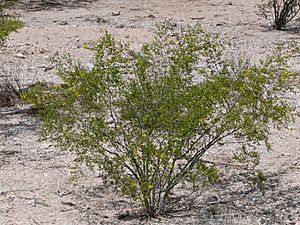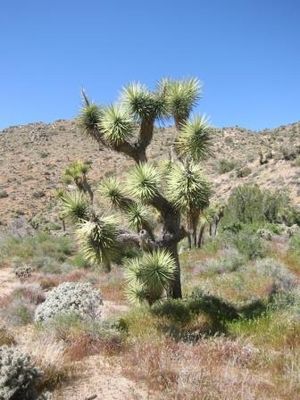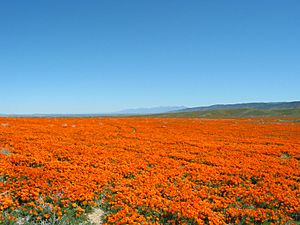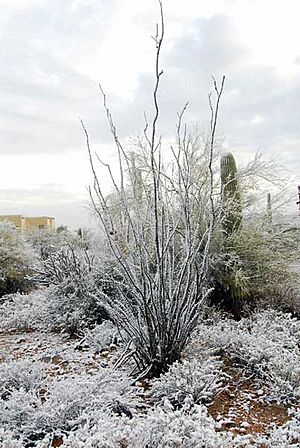Madrean Region facts for kids
The Madrean Region is a special area in North America where certain types of plants grow. It's named after the Sierra Madre Occidental mountains. This region covers dry or semi-dry parts of the southwestern United States and northwestern Mexico.

The Madrean Region is known for its unique plants. It has at least three plant families that are found nowhere else in the world! These are called Fouquieriaceae, Simmondsiaceae, and Setchellanthaceae. Many other plant families, like Crossosomataceae and Garryaceae, also grow mostly here.
Scientists believe that more than 250 groups of plants (called genera) and over half of all the plant species in this region are endemic. This means they are native and unique to the Madrean Region.
Contents
Exploring the Plant Zones
The Madrean Region is divided into four main plant zones, called floristic provinces. Each one has its own special features.
- Great Basin Province
- Californian Province
- Sonoran Province
- Mexican Highlands Province
Great Basin Province: High Deserts and Ancient Trees
The Great Basin Floristic Province includes most of the Great Basin area. It also covers the Colorado Plateau and parts of Arizona. This province shares many plants with its neighbors.
About 25% of the plant species here are unique to the Great Basin. You can find many special kinds of plants like Astragalus, Eriogonum, and Penstemon.
In the central Great Basin shrub steppe, you'll see lots of Artemisia species, also known as sagebrush. The Great Basin montane forests are home to very old trees. These include the ancient Great Basin bristlecone pine.
Californian Province: A Plant Paradise
The Californian Province stretches across Central and Southern California. It goes from the coast up to the foothills of the Cascade Range and the Sierra Nevada mountains. It also includes northern parts of Baja California in Mexico.
This province has the most diverse plant life in the entire Madrean Region. About half of all the plant species here are unique to this area! More than 50 plant groups (genera) are found only or mostly here. Some examples are Adenostoma and Fremontodendron.
Many other plants, like Arctostaphylos (manzanita) and Ceanothus (California lilac), have their main areas of diversity here. This means you'll find many different kinds of these plants in California. The plant life in the Californian Province is very varied.
Sonoran Province: Home of the Cactus
The Sonoran Province covers dry areas in the southwestern U.S. and northwestern Mexico. This includes the Mojave, Sonora, and Chihuahua Deserts.
The plants here are mostly Yucca species, like the famous Joshua Tree. You'll also see many different kinds of cacti, such as Opuntia (prickly pear). The Larrea tridentata, also known as the Creosote bush, is also very common.
Mexican Highlands Province: Pine and Oak Forests
The Mexican Highlands Province is found in the Mexican Plateau region. This area is known for its beautiful pine-oak forests.
 | Janet Taylor Pickett |
 | Synthia Saint James |
 | Howardena Pindell |
 | Faith Ringgold |




